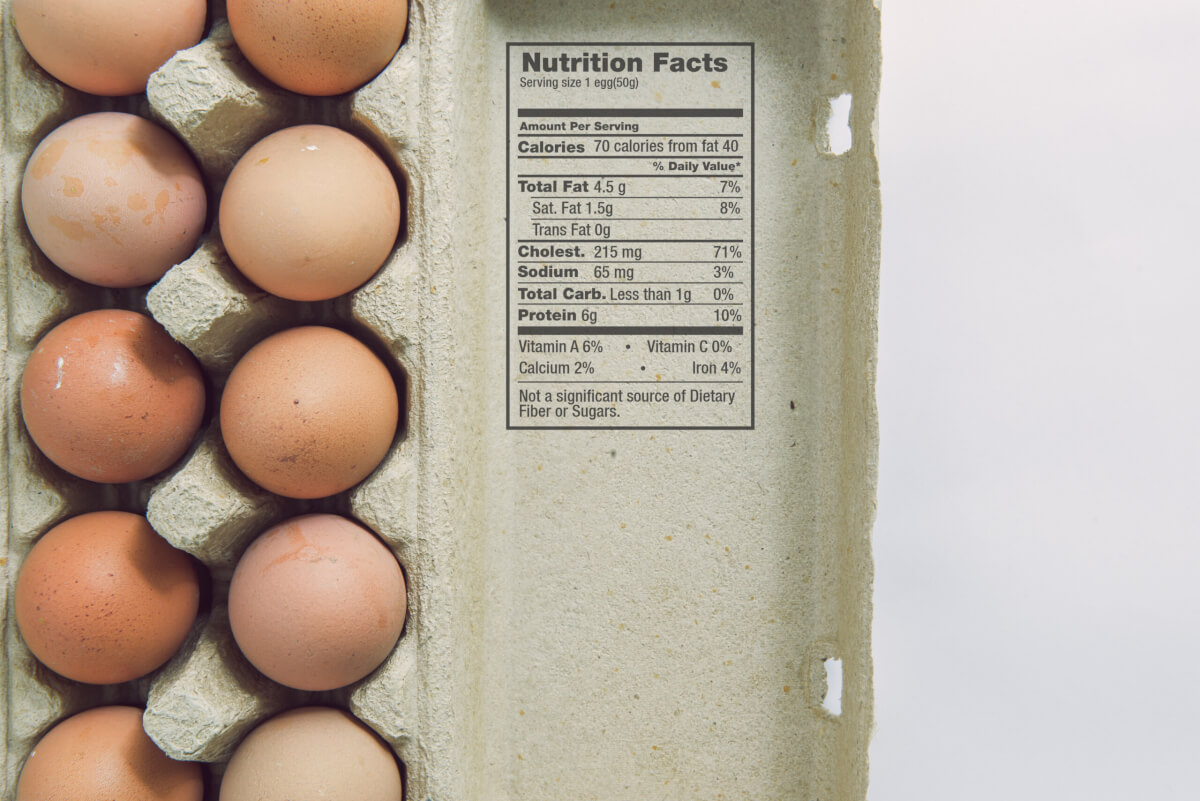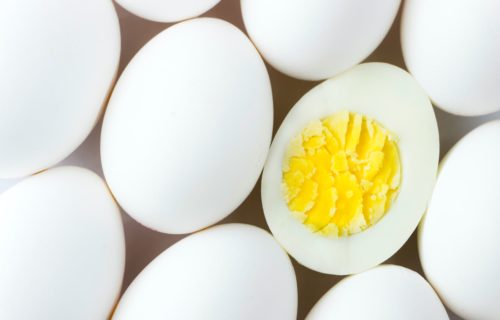DURHAM, N.C. — For decades, eggs have been at the center of a heated debate in the nutrition world. On one side, proponents tout them as a nutrient-dense, protein-packed superfood. On the other, critics warn of their high cholesterol content and potential harm to heart health. But a new study, presented at the American College of Cardiology’s Annual Scientific Session, suggests that the humble egg may not be the villain it’s often cracked up to be – at least when it comes to fortified varieties.
The egg debate dates back to the 1970s, when the American Heart Association first recommended limiting egg consumption to reduce the risk of heart disease. The concern centered around the high cholesterol content of egg yolks, with a single large egg containing about 186 milligrams of cholesterol – more than half the recommended daily limit at the time.

However, subsequent research began to chip away at the egg’s bad reputation. Studies suggested that dietary cholesterol had less impact on blood cholesterol levels than previously thought, and that saturated and trans fats were the real culprits in raising heart disease risk. In 2015, the Dietary Guidelines for Americans even removed the recommended limit on cholesterol intake, although they still advised eating as little dietary cholesterol as possible.
Now, the PROSPERITY trial, a prospective, controlled study, is adding a new layer to the egg debate. The study focused specifically on fortified eggs, which are enriched with nutrients like omega-3 fatty acids, vitamin D, and selenium. Researchers wanted to see if consuming these souped-up eggs regularly would impact markers of heart health differently than eating few or no eggs.
The results, while not conclusive, are certainly intriguing. Over a four-month period, participants who ate 12 or more fortified eggs per week showed no significant differences in their levels of “good” HDL cholesterol or “bad” LDL cholesterol compared to those who ate fewer than two eggs per week. This held true even though the participants were all at high risk for heart disease.
“This is a small study, but it gives us reassurance that eating fortified eggs is OK with regard to lipid effects over four months, even among a more high-risk population,” says lead author Dr. Nina Nouhravesh, a research fellow at the Duke Clinical Research Institute, in a statement.
What’s more, the fortified egg group showed numerical improvements in several other markers of heart health, including total cholesterol, LDL particle number, and insulin resistance scores. While these findings need to be confirmed in larger studies, they suggest that the extra nutrients in fortified eggs could offer some cardiac benefits.
Of course, the study has its limitations, including its small size and reliance on participants’ self-reporting of their egg intake. And it’s important to note that the study was funded by Eggland’s Best, a major producer of fortified eggs.

Nonetheless, the findings add an interesting twist to the long-running egg debate. They suggest that not all eggs are created equal, and that the nutrient profile of fortified eggs could make them a more heart-friendly choice than conventional eggs.
However, experts caution that eggs are just one piece of the dietary puzzle when it comes to heart health. What you eat alongside your eggs matters too. Pairing them with saturated fat-laden bacon, sausage, and butter may negate any potential benefits, while serving them up with heart-healthy veggies, whole grains, and lean proteins could enhance their nutritional profile.
As the egg debate continues to evolve, one thing is clear: blanket statements about eggs being “good” or “bad” for heart health are likely an oversimplification. The reality is more nuanced, depending on factors like the type of egg, the individual’s overall diet and health status, and even their cooking method.
For now, the age-old adage of “everything in moderation” seems to hold true for eggs as for so many other foods. And if you do choose to enjoy them regularly, opting for nutrient-fortified varieties could offer some extra heart-healthy benefits. As always, it’s best to consult with your doctor or a registered dietitian to determine what dietary pattern is right for your individual needs and health goals.

> the humble egg may not be the villain it’s often cracked up to be
Hah, hah, hah, very punny.
It’s kind of hard to believe that this debate began in the 1970’s, 50 years ago and they still don’t know what’s going on with respect to cholesterol? Spending money and everyone’s time to do all these studies and we still don’t have a good handle on how cholesterol gets to be a health problem.
Or is it that they just do not want to offend or throw off spending for large agricultural industries with lots of political power and that contribute a lot to the economy?
They do know what’s going on with respect to cholesterol. Companies that want to sell you eggs keep making it seem like there is confusion by funding and publishing misleading data. And then the media eats it up because we love to hear good news about tasty rich foods.
This study was sponsored by Egglands Best… Knowing that I barely care to find the actual study and try to see how they are misleading us.
What is interesting is that the top lipidologists in their research have found that consumed cholesterol does not have the impact that they believe it had. If you want to talk about biased studies, go back and look at who funded the stuff in the 70s & 80s: the big grain producers. There are now several studies that have shown that the high corn & grain (carb) / low fat diet causes the liver to produce more of the bad cholesterol components (apo-B & lpa) and that most of the consumed cholesterol passes through the intestines. There are some people that will absorb more consumed cholesterol than others, and there are meds like ezetimibe that help mitigate that. Saturated fats also contribute to your liver producing the bad stuff. As someone who eats eggs almost daily and who has cut a lot of carbs, my LDL is down from 183 back in 2016 to the 80s with meds, but then to as low as 41 by reducing carbs significantly.
Emmet, you’re cynical but wrong. See the paper “Dietary Cholesterol and the Lack of Evidence in Cardiovascular Disease”, https://www.ncbi.nlm.nih.gov/pmc/articles/PMC6024687/. Fortunately, there’s an even more cynical explanation to replace the one you’re going to have to give up. See the book Good Calories, Bad Calories.
“And it’s important to note that the study was funded by Eggland’s Best, a major producer of fortified eggs.”
This disclaimer is buried right at the very end of a long, pseudo-scientific article. Now we know that Eggland paid to have this advertorial fluff published by so-called Study Finds.
Follow the money.
“The study was funded by Eggland’s Best.”
Yep. Nothing to see here
Bingo
No, studies with humans are always difficult because there are so many variables and you have to follow ethics. If you could stick 50 humans in cages and feed them only eggs, we might have better answers, but obviously that would be an awful thing to do.
At 58 I began having heart issues. Should have been 38 or 28 even. In my teenage years my mother would ask me how many eggs I wanted for breakfast. I usually said 4. Sometimes 5. Occasionally 3. I had eggs for breakfast often. Often with butter fried toast. About 4 slices. Sometimes with orange juice and sometimes with whole milk. And not just 8 ounces either. I usually had beef bacon as well. I’m not completely sold on the cholesterol/saturated fat, although I follow doctors guidelines pretty closely. I think S-T-R-E-S-S is what doctors need to stress more in their studies. MUCH more. That is, if they REALLY care about our health. Chirp vs beep.
This flip-flopping only undermines peoples’ trust in science. And you wonder how flat-earthers become emboldened.
Eggs , Coffee , Milk , Butter , Bacon … One day deadly poison , the next a valuable supplement .
Proves one thing to me : ” They ” dont know what the phuck they are talking about . I have seen viable , healthy , active people become bed ridden by ‘ statins ‘ .
Naturally occurring saturated fats along with the accompanying protein and eating it until satiated is the ONLY thing your body requires to be healthy.
Beverages containing sugar, ultra processed food and carbs in general make the consumer fat, dumb, chronically ill, and die much younger than otherwise.
It’s literally that simple. The government and big processed food companies won’t tell you that because they want you fat, dumb and die young. Preferably, they want you dead before you start collecting social security.
Right on, Olivia! Carno has cured many things for me.
Pasture raised eggs naturally have far more vitamins and minerals than eggs from caged birds, in many cases more than double the amount. So fortified eggs are not the only option.
Without actually seeing the study its hard to comment on the design. The more important question is how do whole eggs affect your lipid numbers, specifically LDL, and what is the significance in the context of your risk profile. Cholesterol normally has a dose affective impact on LDL for the majority of us; the more you eat, the higher it’ll go. Of course there will be small outliers who are non responders, and some who will be hyper responders. Eggs are relatively low in saturated fat, which is known to increase LDL (and ApoB) at a much higher rate that just dietary cholesterol alone. So the real question is are eggs healthy or not for you.
We have backyard chickens that are fed organic feed, and since my husband has been eating them for several years, my husband’s cholesterol has LOWERED. You know, cholesterol is necessary for proper brain function, so I wonder about the real reason why they want us eating less of it.
If you want to know how to eat healthily, do the exacr opposite of every vegan, vegetarian, and fad dieter with their harebrained diet plan
The yoke is on Eggland’s Best.
So once again, Dr. Atkins was right. Too bad he didn’t live long enough to see everything he said was correct. He was a cardiologist and understood this and low carb dieting, as very helpful to overall health.
My wife and I (70 yrs old) live on a small farm where we raise our own beef, chickens and vegetables. We also have a Jersey milk cow and my wife makes our own cheese, butter, and yogurt with our unpasteurized milk. My normal breakfast is 3 eggs, 4 pieces of bacon, and two pieces of homemade sourdough bread slathered in butter. My chlorestoral is 135. My Doctor says our levels are low because our food is not processed.
This is old news and for how long now, 50 years?
Who paid for this BS !!!! I have been VEGAN since 2009. I know the FACTS !!!!!